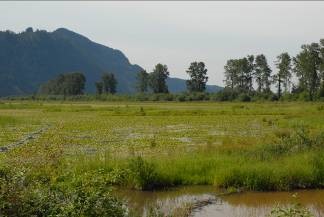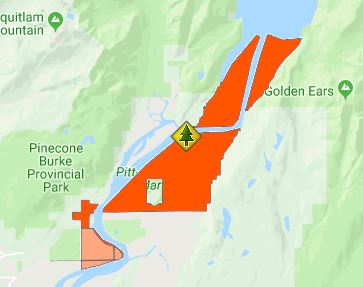Pitt-Addington Marsh Wildlife Management Area
Date Designated: June 11, 1987
Purpose: Management of important wetland habitats in close proximity to Lower Mainland urban populations.
Size: 2,972 hectares
Region: South Coast
Nature and culture
Fish and Wildlife: The Pitt-Addington Marsh WMA supports over 200 bird and 29 mammal species. The area provides important wintering, migration and breeding habitat for waterfowl, shorebirds, raptors, passerine and upland species. Of particular note is the presence of Greater Sandhill Cranes feeding and nesting in and adjacent to the WMA; it is one of only two nesting sites in the Lower Fraser Valley. Other bird species include Canada Goose, Mallard, American Wigeon, Teal, Pintail and Wood Ducks. Raptors, most common during the winter months, include Northern Harrier, Sharp-shinned Hawk, Red-tailed Hawk, Bald Eagle, Kestrel, Turkey Vulture and Osprey. Black Bear, Mule Deer and Coyote are seen regularly, and Cougar have been reported on occasion. Rare elements identified in the WMA include Pointed Broom Sedge, Two-edged Water-starwort and Sessile-leaved Sandbar Willow.
Physiography, Climate and Vegetation: This WMA is generally a flat, alluvial floodplain made up of dyked and undyked areas. Pitt Lake is the largest tidal freshwater lake in the world. There is a rare reverse delta at the mouth of the Pitt River, a result of deposition which occurs when rapidly flooding tides dam and reverse the main Fraser River outflow back up into Pitt Lake. The WMA also surrounds Pitt Polder Ecological Reserve, an area of sedge bog and two forested granitic outcrops rising 114 metres above the floodplain.
Planning and management
Information on management direction and possible restrictions on visitor activities are available from the Conservation Lands regional contacts.
Management Partners:
Image
The Pitt-Addington Marsh WMA is located 60 km east-northeast of Vancouver at the south end of Pitt Lake.



